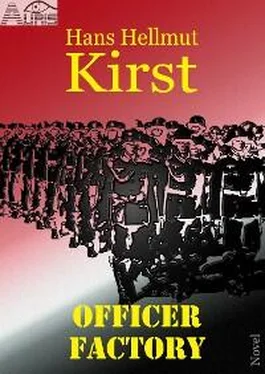“Right," said Lieutenant Krafft, " look into it, that is if you really insist on pressing the charge, Krottenkopf."
“I’m not insisting on anything," the corporal reassured him. “But what else am I to do? The whole barracks is laughing at me, and calling me Waldemar! . . . And my real name's Alfred! Please do something about it, Lieutenant."
“You don't think you might possibly have made a mistake?"
“You’d better ask the three harpies themselves about that. They know best, after all."
Captain Kater had retired to the officers' mess in search of strength and succor. The mess was his own undisputed territory: kitchen, cellar, and all the personnel here, were his direct responsibility in his capacity as the officer commanding the headquarters company. Apart from him, the only other person who had the right to give orders here was the General—though there was little danger of his putting in an appearance during the afternoon.
“Well, now, gentlemen," said Captain Kater briskly,” what can I offer you? Don't be shy; just tell me what you'd like. A funeral like that takes it out of you—you need something to pull you round afterwards. Personally I'd suggest an Armagnac, straight from the cask—twenty years at least in the wood."
The officers took his advice, for at least Kater knew something about drink, having spent a good deal of time in France.
Kater insisted on paying for the round. It didn't cost him much, for there weren't many officers in the mess at the time, only a handful of tactics instructors and a few company commanders. And, in addition to them, the training school's guest of the moment: a certain Wirrmann, judge-advocate by profession, temporarily seconded to the Inspector of Training Schools and posted to Wildlingen-am-Main to investigate the death of Lieutenant Barkow.
This pillar of military justice was a spry little fellow who seemed more interested in the contents of the officers'-mess cellar than anything else. Thus he and Kater got along famously, and Wirrmann found himself with a glass that was full to the brim.
"Well, gentlemen," said Kater, joining the officers,” what a funeral this afternoon! I don't know who one would prefer to find oneself up before—one's Maker or the General."
“I must say you'd make a splendid corpse," said Captain Feders cheerfully. “No question of it—the funeral would make a most happy affair. One's only got to think of all those supplies of yours that would be automatically released."
“Captain Feders," said Kater icily, " I'm surprised to find you in the mess at this time of day. Besides, you're a married man and your wife may be waiting for you."
At this, Feders seemed on the point of losing self-control altogether. All trace of humor vanished from his face. The officers eyed him warily, for everyone knew his Achilles heel though few would have risked wounding him there. Kater had acted carelessly, to say the least.
Feders began to laugh, but there was a raw, dangerous edge to the sound.
“Kater," he said, “if you're surprised to find me in the mess at this time of day, all I can say is that I'm even more surprised to find you here. Normally you should be in that pig-sty of yours by now, trying to keep some sort of order there, to put it mildly. But presumably you've delegated the job to someone else—this fellow Krafft, I suppose. He's got a broad back certainly, so broad in fact, Kater, that he could quite easily carry you off altogether if he felt like it. This fellow Krafft's no fool, I should say, and if I were in your shoes, Kater, I wouldn't be feeling too happy at the moment."
This remark went home all right, and the Captain rose to his feet. “What an irrepressible fellow you are, Feders!" he said condescendingly in an attempt to laugh, but it didn't sound very convincing. Kater left, saying that he wanted to go and inspect some stores that were arriving.
No sooner had Captain Kater arrived in the officers'-mess kitchen and taken a shot of something to boost his morale with, than Judge-Advocate Wirrmann appeared on the scene.
"Anything worrying you, my dear Herr Kater?" he asked sympathetically.
"Nothing important," Kater assured him.
"Then," said Wirrmann, “you should find it all the easier to confide in someone who is well disposed towards you. You can rest assured, my dear fellow, that if it's justice you're after you've come to the right address."
“Now, ladies," said Lieutenant Krafft, beginning his interrogation, " I'd like you to try and forget both that I'm a man and that I'm an officer."
“That won't be easy," said one of the three girls.
“Do your best, all the same," Krafft advised them. “Imagine I'm a sort of neuter, a personification of the law, if you like. You can talk to me freely, without any false modesty."
“We don't have such a thing anyway," said another of the girls.
Lieutenant Krafft now found himself at what might be called the scene of the crime, that's to say in the communications center in the basement of the H.Q. building. Chairs stood in front of a row of switchboards, above which were circuit diagrams with the inevitable poster, “Beware! The enemy is listening!" There was a table in one corner on which stood coffee cups, a jug and an electric kettle. The latter was officially forbidden throughout the barracks, but since it was Captain Kater and not General Modersohn who was responsible for the ban, no one paid any attention to it. In another corner stood a camp bed—the corpus delicate, so to speak—a shabby, battered, rusty iron bedstead, with a mattress and some blankets on it.
Krafft confronted the three girls behind the switchboards. Their figures were well-developed and their faces pretty and innocent-looking. Their honest, friendly eyes regarded him with curiosity. Though the eldest of these girls was barely more than twenty, they were neither particularly embarrassed nor excited, seeming to have no sense of guilt at all.
“What can you have been thinking of, ladies?" asked Lieutenant Krafft warily.
“Absolutely nothing," said one of the girls, which sounded convincing enough.
“Right," said Krafft. “I admit the business demands no particularly strenuous intellectual effort, but some sort of thought-process is unavoidable. For example: why exactly did you have to pick on Corporal Krottenkopf?"
“Oh, anyone would have done," said one of the girls, managing to smile at Krafft, ”and this Krottenkopf just happened to be handy."
Lieutenant Krafft found he had to sit down. The whole affair seemed to him either fearfully complex or else amazingly simple, which sometimes amounted to the same thing.
“At any rate," said Krafft finally, “you did lay hands on him, didn't you?"
The girls looked at each other. They seemed to have come to a pretty careful agreement about what they were to say. Krafft couldn't really take objection to this. He had no particular wish to start a major judicial process. So he simply smiled encouragement at the astonishing creatures.
" It's true," said one of them, a pretty little thing, with a wide baby smile and frank honest eyes, and a sort of roguishness about her reminiscent of her grandmother's era in the First World War, " it's true we took his clothes off, but we then meant simply to throw him out as a sort of demonstration. The trouble was he wouldn't budge."
Читать дальше












